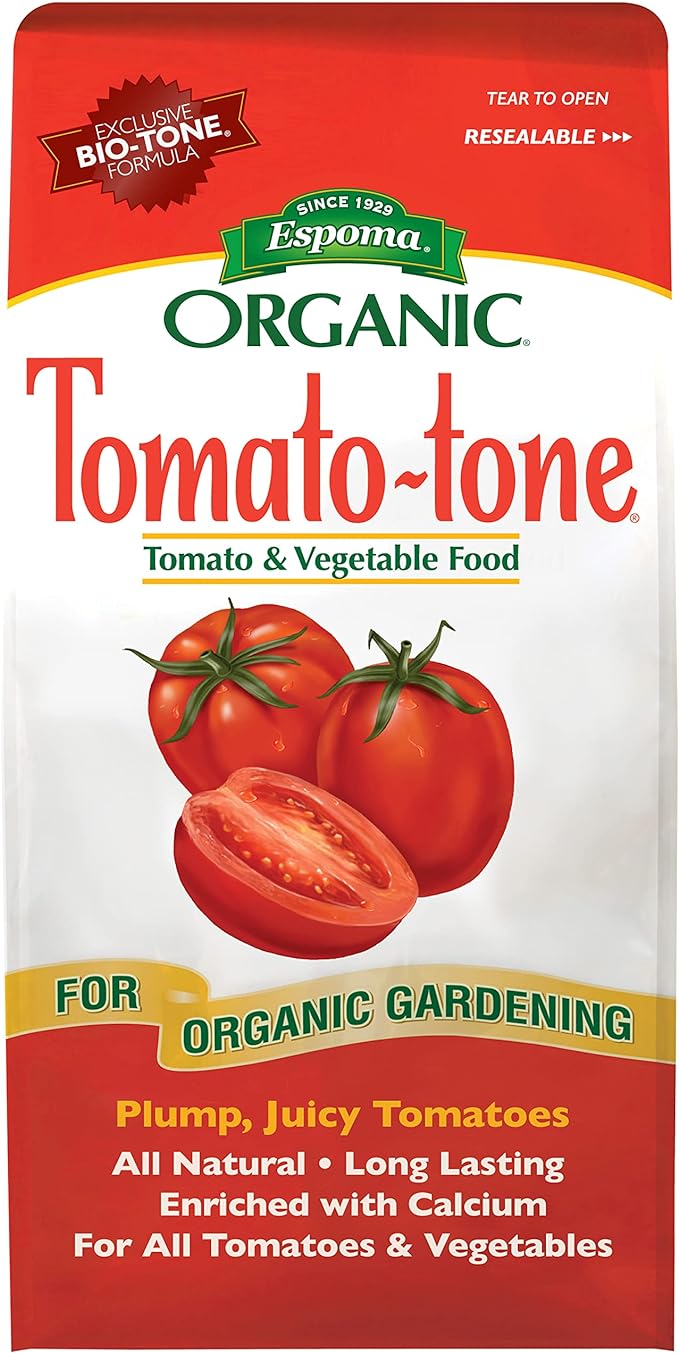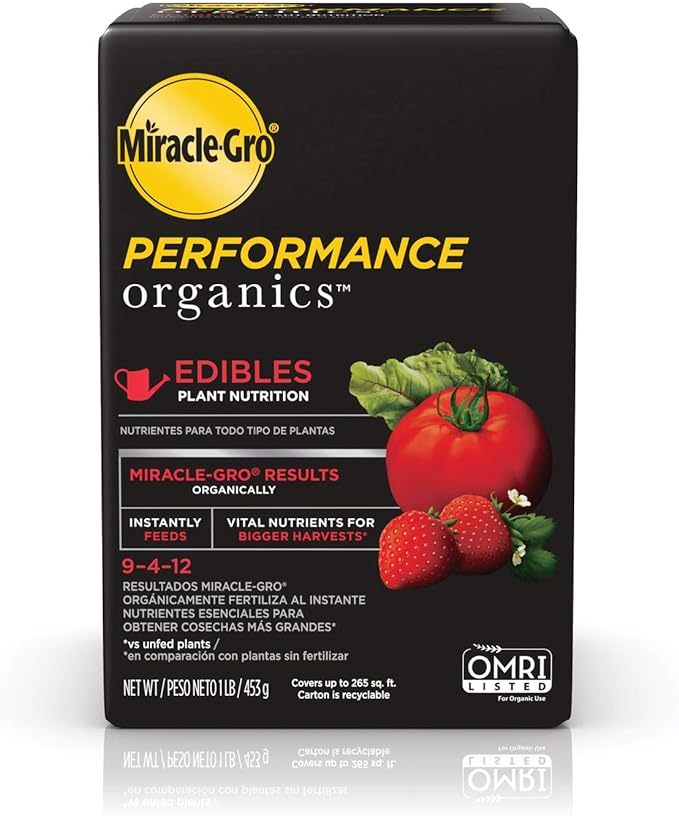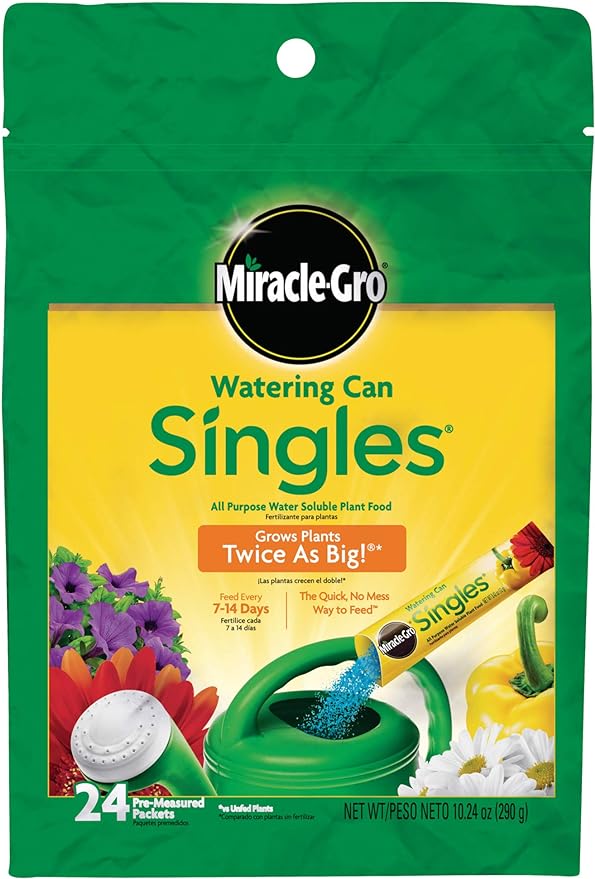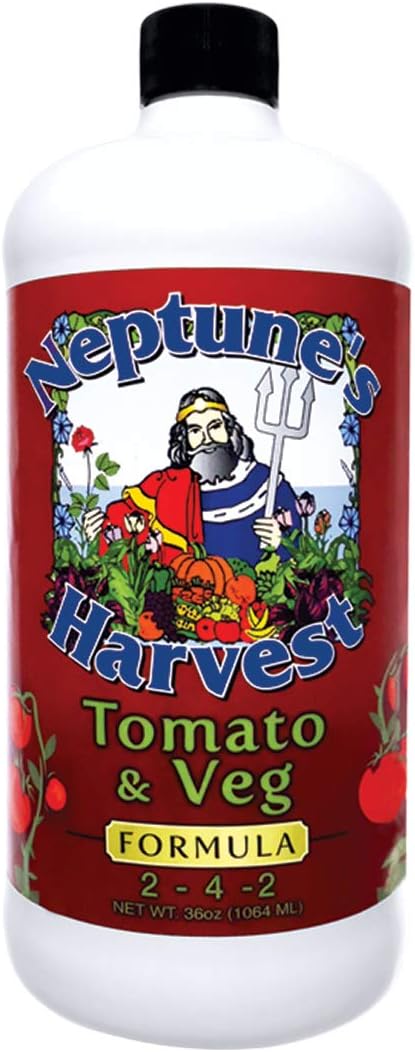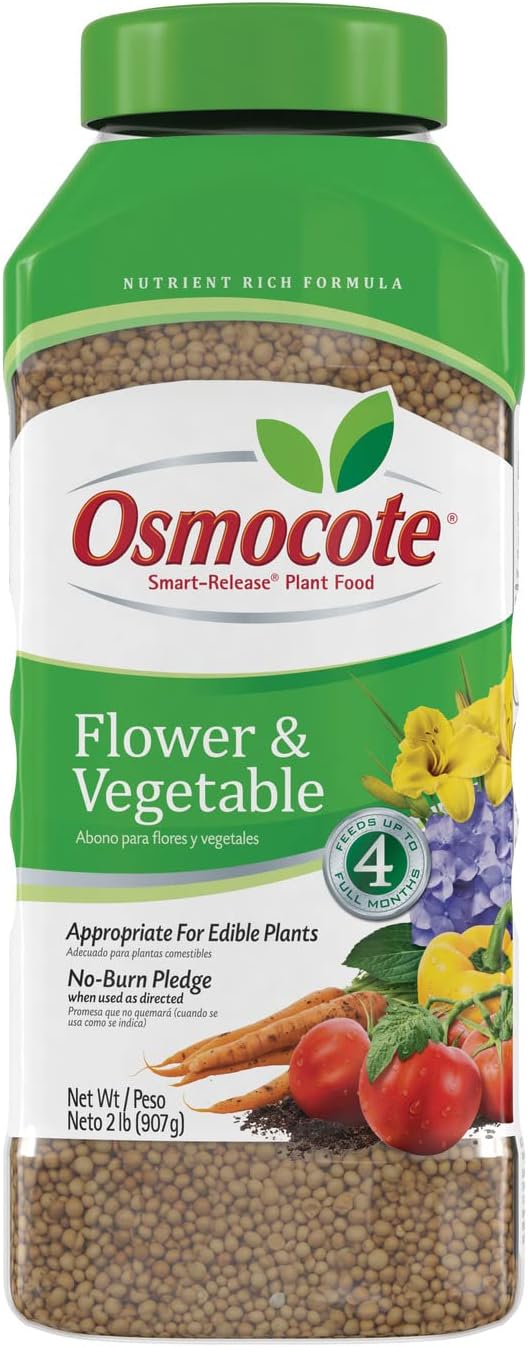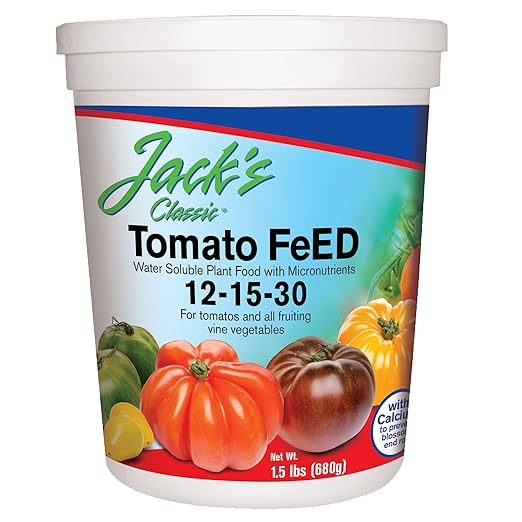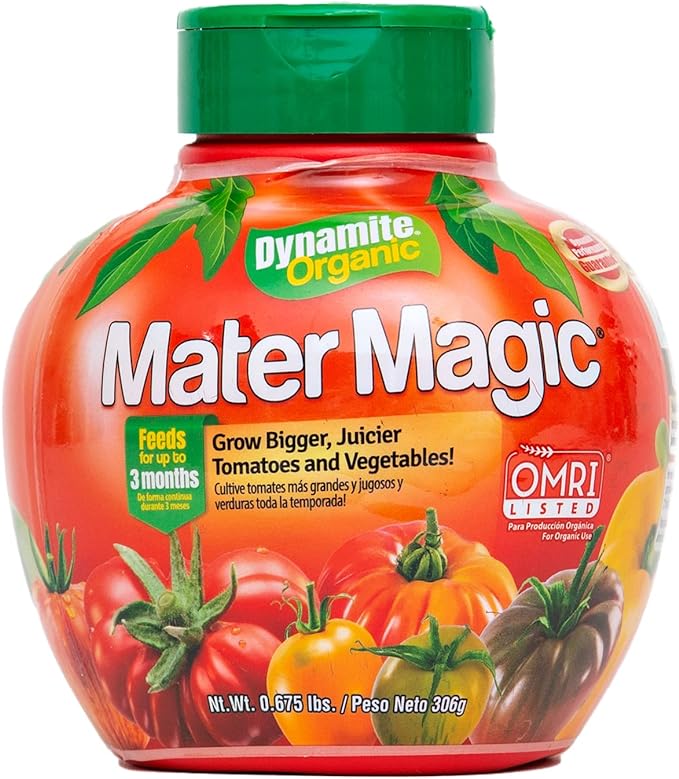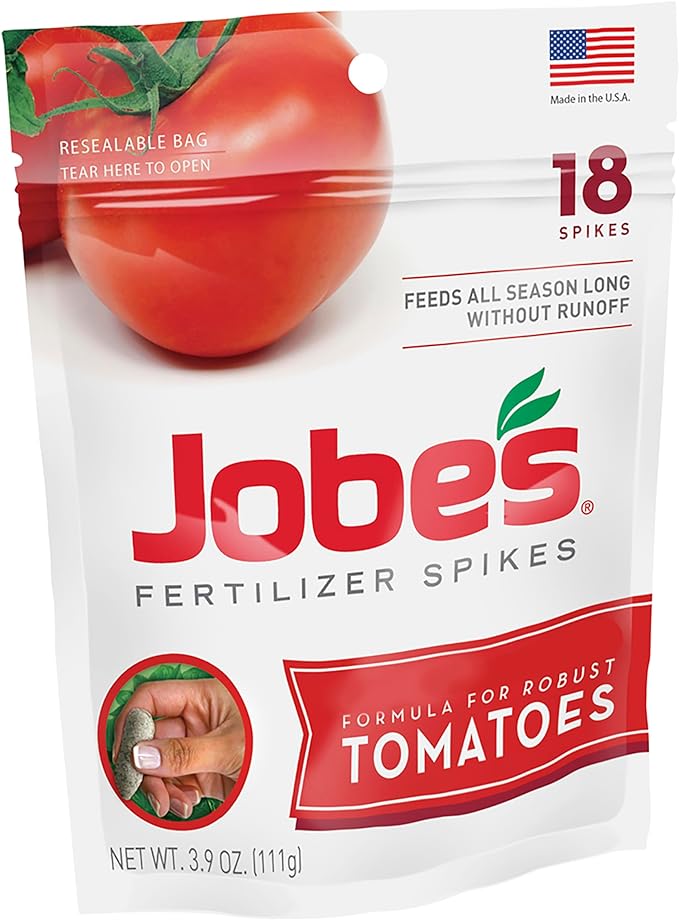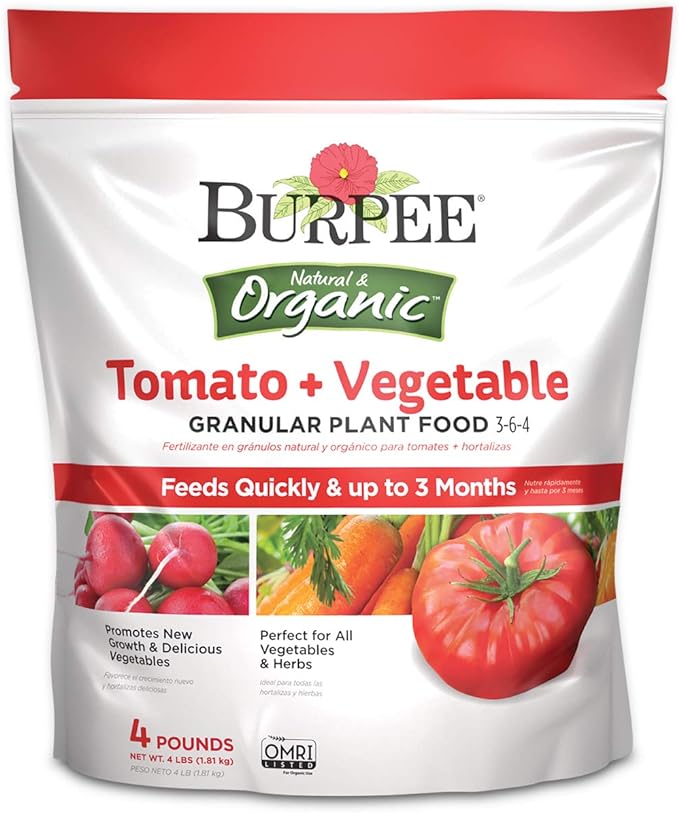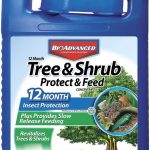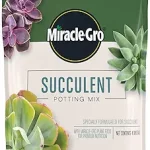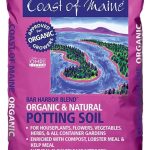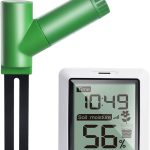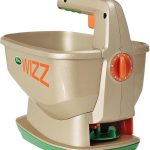Just like the ancient Greeks sought the secret to eternal youth, you’re on a quest for the perfect tomato – plump, juicy, and bursting with flavor. But, as any seasoned gardener knows, the key to growing exceptional tomatoes lies in the soil. With so many fertilizers on the market, it’s overwhelming to choose the best one. You’re about to uncover the top 9 tomato fertilizers that’ll take your harvest to the next level. From eco-friendly formulas to slow-release wonders, these game-changers will make you wonder how you ever managed without them.
Contents
- Espoma Organic Tomato-Tone Fertilizer
- Miracle-Gro Organic Plant Food
- Miracle-Gro Water Soluble Plant Food
- Neptunes Harvest Tomato & Veg Fertilizer 2-4-2, 36 oz
- Osmocote Smart-Release Plant Food Flower & Vegetable, 2 lb.
- Jacks Classic Tomato Feed Fertilizer
- Dynamite Mater Magic Organic Tomato Fertilizer
- Jobe’s Garden Fertilizer Spikes for Tomato Plants
- Burpee Organic Tomato & Vegetable Granular Plant Food, 4 lb
- Factors to Consider When Choosing Tomato Fertilizers
- Frequently Asked Questions
- Conclusion
Espoma Organic Tomato-Tone Fertilizer
If you’re an organic gardener seeking a fertilizer that promotes healthy tomato growth and prevents blossom end rot, Espoma Organic Tomato-Tone Fertilizer is an excellent choice.
This environmentally safe fertilizer is specifically formulated with 8% calcium to prevent blossom end rot, ensuring you get plump and abundant tomatoes.
With a 3-4-6 fertilizer analysis, it’s perfect for all types of tomatoes and vegetables.
Simply apply it to the soil around the drip line of your plant, water thoroughly, and repeat every two weeks through the growing season.
You’ll be rewarded with an increase in flower and fruit production, and healthy, thriving plants.
Best For: Organic gardeners seeking a fertilizer that promotes healthy tomato growth and prevents blossom end rot.
Pros:
- Environmentally safe and registered Organic Input Material for organic gardening
- Promotes flower and fruit production, and prevents blossom end rot with its 8% calcium concentration
- Easy to use and produces plump and abundant tomatoes
Cons:
- Some customers mentioned a strong fertilizer smell
- No specific instructions for application rates or frequency for other types of plants
- No long-term effects or guarantees provided
Miracle-Gro Organic Plant Food
For those seeking a fertilizer that feeds their plants instantly, Miracle-Gro Organic Plant Food is an excellent choice, providing a bountiful harvest for your tomatoes, vegetables, herbs, and fruits.
This OMRI-listed organic plant food is specifically formulated for growing these crops, and you can apply it every 7 days using a watering can or a Miracle-Gro Performance Organics Garden Feeder.
With over 5,000 ratings and a 4.5-star rating, it’s clear that many gardeners have seen success with this product.
Just be aware that some users have reported a strong smell, difficulty dissolving the fertilizer, and issues with residue at the bottom of the watering can.
Overall, if you’re looking for a reliable fertilizer that will give you a plentiful harvest, Miracle-Gro Organic Plant Food is definitely worth considering.
Best For: Gardeners growing tomatoes, vegetables, herbs, and fruits who want an OMRI-listed organic plant food that provides a bountiful harvest.
Pros:
- Feeds plants instantly for a quick and healthy growth
- Specifically formulated for growing tomatoes, vegetables, herbs, and fruits
- Can be applied every 7 days for best results
Cons:
- Some customers reported a strong, unpleasant smell
- Some customers reported difficulty with dissolving the fertilizer in water
- Some customers reported issues with the fertilizer not fully dissolving, leaving residue at the bottom of the watering can
Miracle-Gro Water Soluble Plant Food
With its convenient, pre-measured packets, Miracle-Gro Water Soluble Plant Food is the best choice for busy gardeners seeking a hassle-free way to feed their plants.
You’ll love how easy it’s to use – simply pour the contents of a packet into a gallon of water, and you’re good to go!
This plant food is perfect for feeding your tomatoes, as well as other flowers, vegetables, houseplants, roses, and trees and shrubs.
It’s formulated to promote quick, beautiful results, and it’s been proven to grow plants twice as big as unfed plants.
With 24 pre-measured packets in each container, you’ll have plenty of fertilizer on hand to keep your plants thriving all season long.
Best For: Busy gardeners seeking a hassle-free way to feed their plants.
Pros:
- Convenient, pre-measured packets make feeding plants easy and mess-free
- Formulated to promote quick, beautiful results and grows plants twice as big as unfed plants
- Perfect for feeding a variety of plants, including flowers, vegetables, houseplants, roses, and trees and shrubs
Cons:
- Not specified (there are no negative reviews or drawbacks mentioned in the product description)
Neptunes Harvest Tomato & Veg Fertilizer 2-4-2, 36 oz
Are you seeking a fertilizer that will boost the vigor and volume of your tomatoes and vegetables, and help them thrive even in drought conditions?
Neptunes Harvest Tomato & Veg Fertilizer 2-4-2, 36 oz might be the perfect solution for you.
This fertilizer is specifically designed to increase the vigor and volume of your tomatoes and vegetables, while also helping them tolerate drought conditions.
With its 2-4-2 blend of nitrogen, phosphorus, and potassium, it promotes strong root development, abundant blossoms, and increased fruit production.
You’ll love how easy it’s to apply, and the bountiful harvest it yields.
Plus, it’s not just limited to tomatoes and veggies – it’s also great for trees, shrubs, and flowers.
Best For: Gardeners who want to increase the vigor and volume of their tomatoes and vegetables, and help them thrive even in drought conditions.
Pros:
- Nutrient-rich formula for optimal growth
- Easy application
- Bountiful harvest
Cons:
- Pricey
- Strong, fishy odor
Osmocote Smart-Release Plant Food Flower & Vegetable, 2 lb.
Osmocote Smart-Release Plant Food Flower & Vegetable, 2 lb. is an excellent choice if you’re seeking a fertilizer that provides long-term nutrition without the risk of burning your plants.
Its mistake-proof formula guarantees vigorous growth for up to 6 months.
With a balanced NPK formula of 14-14-14, this fertilizer promotes strong roots and vigorous above-ground growth.
The slow-release technology provides a steady supply of nutrients, and the mistake-proof formula means you don’t have to worry about over-application.
You can use it to fertilize your tomato plants, as well as flowers, vegetables, and herbs, both indoors and outdoors.
Plus, it’s easy to apply, covering 40 sq. ft. of soil, and comes with an applicator for convenient use.
Best For: Gardening enthusiasts and plant owners who want a long-lasting, mistake-proof fertilizer for their flowers, vegetables, and herbs.
Pros:
- Provides long-term nutrition for up to 6 months with its slow-release technology
- Promotes strong roots and vigorous above-ground growth with its balanced NPK formula of 14-14-14
- Easy to apply and comes with an applicator for convenient use
Cons:
- No notable drawbacks mentioned in the product description
- No information available on potential environmental impact
- May not be suitable for all types of plants or soil conditions
Jacks Classic Tomato Feed Fertilizer
For gardeners seeking a fertilizer that promotes vigorous plant growth, abundant flowering, and fruit set, Jacks Classic Tomato Feed Fertilizer stands out with its 12-15-30 analysis and micronutrients for ideal growth and health.
You’ll appreciate the water-soluble powder that makes multiple gallons of liquid fertilizer, and the included measuring spoon makes it easy to use.
This fertilizer is cost-effective compared to liquid fertilizers and prevents blossom rot in tomatoes with added calcium and magnesium.
You can expect significant and noticeable growth within 2 days of application, and it’s effective for tomatoes, peppers, cucumbers, squash, and other blooming vegetables.
With a 1.5lbs container lasting for 1 month, you’ll get great value for your money.
Best For: Gardeners seeking a fertilizer that promotes vigorous plant growth, abundant flowering, and fruit set, particularly for tomatoes, peppers, cucumbers, squash, and other blooming vegetables.
Pros:
- Cost-effective compared to liquid fertilizers
- Prevents blossom rot in tomatoes with added calcium and magnesium
- Promotes significant and noticeable growth within 2 days of application
Cons:
- Requires reapplication if magnesium or calcium deficiencies are noticed later in the season
- May need to switch to all-purpose or bloom booster after the first two fertilizer applications
- No specific instructions for indoor gardening and houseplants (although it is mentioned as a benefit)
Dynamite Mater Magic Organic Tomato Fertilizer
Looking for a natural and organic fertilizer that feeds your tomato plants continuously for up to 3 months?
Dynamite Mater Magic Organic Tomato Fertilizer is the perfect solution for you. This OMRI-listed fertilizer is a nitrogen and calcium-rich plant food that promotes healthy plant growth and increases tomato yields.
With its convenient shaker lid, you can easily sprinkle the granules around your plants. As a bonus, it prevents end rot and promotes bigger, juicier tomatoes with higher yields.
With an impressive 4.5-star rating from 662 customers, you can trust that this fertilizer will deliver results.
You’ll be pleased to know that it’s not just limited to tomatoes – it’s suitable for all flowering shrubs, trees, landscape plants, foliage, houseplants, ferns, palms, grasses, and herbs.
Best For: Gardeners and plant enthusiasts who want a natural and organic fertilizer that promotes healthy plant growth and increases tomato yields.
Pros:
- Effective in promoting healthy plant growth and increasing tomato yields
- Convenient to use with a shaker lid and suitable for a wide range of plants
- OMRI-listed and natural, making it a safe choice for gardeners who prefer organic products
Cons:
- No negative reviews were found, but it’s possible that some users may not see the desired results
- The product is not specifically formulated for other types of plants, so results may vary
- No other cons were mentioned in the customer reviews
Jobe’s Garden Fertilizer Spikes for Tomato Plants
With its slow-release formula feeding plants for up to 8 weeks, Jobe’s Garden Fertilizer Spikes for Tomato Plants is the best choice for gardeners seeking a low-maintenance yet highly effective way to nourish their tomato plants.
You’ll appreciate the pre-measured spikes that provide the right amount of nutrients without the risk of over-fertilizing. The 6-18-6 NPK formula provides a continuous supply of nutrients, and the spikes are mess-free, hazard-free, and odorless.
As a result, you can rely on Jobe’s Garden Fertilizer Spikes to give you beautiful, healthy tomato plants. Available in a waterproof pouch or cardboard blister card pack, you can trust Jobe’s Garden Fertilizer Spikes.
With over 9,450 ratings and a 4.6-star review, it’s clear that this product has earned its spot as a top choice among gardeners.
Best For: Gardeners seeking a low-maintenance yet highly effective way to nourish their tomato plants.
Pros:
- Slow-release formula feeds plants for up to 8 weeks, providing a continuous supply of nutrients.
- Pre-measured spikes eliminate the risk of over-fertilizing and are mess-free, hazard-free, and odorless.
- Available in a waterproof pouch or cardboard blister card pack, making it convenient to use.
Cons:
- None mentioned in the product description or customer reviews.
- None mentioned in the product description or customer reviews.
- None mentioned in the product description or customer reviews.
Burpee Organic Tomato & Vegetable Granular Plant Food, 4 lb
Opting for organic gardening? Burpee Organic Tomato & Vegetable Granular Plant Food, 4 lb is the best choice for those seeking a natural, long-lasting fertilizer that promotes robust plant growth and healthy soil.
You’ll appreciate its easy-to-apply granules that release essential nutrients immediately and continue to provide a continuous stream of plant food for up to 3 months.
As an OMRI-listed product, you can trust it’s suitable for organic use.
This fertilizer is ideal for young bedding plants, established vegetable gardens, and patio container plants.
With its natural composition, you’ll get superior results throughout the season without exposing your plants to synthetic chemicals or harmful additives.
Best For: Organic gardeners who want a natural, long-lasting fertilizer for their vegetables, flowers, and other plants.
Pros:
- Natural composition free from synthetic chemicals and harmful additives
- Easy-to-apply granules that release essential nutrients immediately and continue to provide a continuous stream of plant food for up to 3 months
- OMRI-listed for organic use, making it suitable for a variety of plants and gardens
Cons:
- No specific drawbacks or negative aspects mentioned in the product description or customer reviews
- No information available on potential allergic reactions or interactions with other gardening products
- No mention of any certifications or compliance with specific gardening regulations
Factors to Consider When Choosing Tomato Fertilizers
When choosing a tomato fertilizer, you’ll want to weigh several key factors that impact your plants’ growth.
You’ll need to think about the type of soil you’re working with, the balance of nutrients your tomatoes need, and whether you prefer organic or synthetic fertilizers.
Soil Type Matters
Your tomato plants will thrive in well-fed soil, but the type of soil you’re working with plays a significant role in determining the best fertilizer for the job.
If you have sandy soil, you’ll need to apply fertilizer more frequently to prevent nutrient leaching. On the other hand, if you have clay soil, you’ll want to apply fertilizer less frequently to avoid over-fertilization.
Soil pH is also essential, as most nutrients are available to plants at a pH range of 6.0-7.0. You’ll want to choose a fertilizer that takes your soil’s pH into account.
Additionally, if you’ve amended your soil with compost, you may not need as much fertilizer, since the organic matter provides slow-release nutrients.
The texture and structure of your soil also influence how water and nutrients move through it. Coarse-textured soils allow for faster movement, while fine-textured soils slow it down.
To make informed fertilizer choices, consider getting your soil tested to determine its nutrient content and pH. This will help you tailor your fertilizer selection to your specific soil type, ensuring your tomato plants get exactly what they need to thrive.
Nutrient Balance Counts
You’ll want to verify that your tomato fertilizer provides a balanced mix of nutrients, as getting this blend right is critical to promoting healthy plant growth, fruit production, and disease resistance in your tomatoes.
A balanced fertilizer should contain nitrogen (N), phosphorus (P), and potassium (K) in a ratio of 3-4-6 or 5-10-15. Nitrogen promotes leaf growth and green color, phosphorus supports root development and flower production, and potassium enhances overall plant health and resistance to disease.
Additionally, don’t forget to check for calcium, an essential micronutrient that prevents blossom-end rot and promotes cell wall development in tomatoes.
Depending on your goals, you may want a fertilizer with a higher phosphorus content (e.g., 10-20-10) to promote fruiting and flowering, or a balanced fertilizer (e.g., 10-10-10) to support overall plant growth and development.
Finally, keep in mind that soil pH can affect nutrient availability, so aim for a slightly acidic to neutral soil pH (6.0-7.0) for ideal nutrient uptake.
Organic Vs Synthetic
As you weigh your options for tomato fertilizers, the debate between organic and synthetic formulations becomes a pivotal consideration, with each type offering distinct advantages and drawbacks.
Organic fertilizers, made from natural sources like bone meal, compost, or manure, release nutrients slowly and promote healthy soil microbiology. This approach tends to be more environmentally friendly, as organic fertilizers are biodegradable and non-toxic. They also have a longer-lasting effect on soil fertility and can improve soil structure, increase water retention, and support biodiversity.
On the other hand, synthetic fertilizers, like ammonium nitrate and urea, provide rapid nutrient uptake, but can harm beneficial microorganisms and contaminate soil and water. They may require frequent reapplication to maintain plant growth and can lead to soil degradation, water pollution, and decreased soil fertility over time.
As you decide between organic and synthetic fertilizers, consider the long-term impact on your soil and the environment. Will you opt for a quick fix or a sustainable approach that promotes soil health and biodiversity?
Fertilizer Form Factor
When selecting a tomato fertilizer, the form factor is essential, as it determines how easily the nutrients are absorbed by the plants, and granular, liquid, and powdered forms each offer unique advantages.
You’ll want to weigh your options carefully and decide which type best fits your gardening needs.
Granular fertilizers, for instance, are easy to apply and can be worked into the soil before planting. They’re a popular choice for tomatoes because they provide a slow release of nutrients.
If you need a quick fix, liquid fertilizers can provide immediate nutrition to your plants, and can be used as a foliar spray or added to the soil.
Fertilizer spikes or tablets are another convenient option, slowly releasing nutrients over time, making them perfect for small gardens or individual plants.
Don’t forget about organic fertilizers, often coming in powder or granular form, which may require mixing with water before application.
Timing Is Everything
Timing is critical when fertilizing tomatoes, as applying nutrients at the right moment can boost yields by up to 20%. You’ll want to fertilize at planting and again 2-3 weeks later to maximize growth.
But be careful not to fertilize too early, as this can lead to weak and leggy plants. Fertilizing too late can also hinder nutrient uptake.
Different growth stages require different nutrients. For example, seedlings need more phosphorus for root development, while fruiting plants need more potassium for fruit production.
To avoid over-fertilization, consider split applications, where you apply a small amount at planting and again 2-3 weeks later. This optimizes nutrient uptake and prevents excessive growth.
Soil temperature also plays a vital role in fertilizer timing. Nutrients are absorbed more efficiently when soil temperatures are between 60-80°F (15-27°C).
Calcium Content Crucial
You’ll want to choose a fertilizer that provides the necessary calcium for healthy plant growth and fruit production, as a calcium deficiency can wreak havoc on your tomato crop.
Calcium is essential for preventing blossom end rot, a common issue that can lead to fruit decay and plant damage.
A calcium-rich fertilizer can provide up to 8% calcium, which is vital for promoting healthy plant growth and fruit production.
Without sufficient calcium, your plants may experience stunted growth, yellowing leaves, and poor fruit quality.
When selecting a tomato fertilizer, look for products with a calcium content of at least 5% to guarantee your plants receive the necessary nutrients for peak growth and fruit production.
Additionally, fertilizers with high calcium content can help neutralize soil acidity, creating a more balanced soil pH for ideal plant growth.
By choosing a fertilizer with sufficient calcium, you’ll be giving your tomato plants the best chance to flourish.
Cost and Value Analysis
With fertilizer prices ranging from under $10 to over $50 for a single product, you must weigh the cost against the value each option provides for your tomato plants.
When evaluating the value of a tomato fertilizer, consider the number of applications it provides, the size of the area it can cover, and its overall effectiveness in promoting healthy plant growth.
Organic and natural fertilizers may be more expensive than synthetic options, but they can provide longer-lasting benefits and safer use around pets and children.
A higher price doesn’t always indicate a better product, as some cheaper options may still provide excellent results and better value for the money.
To get the best value, calculate the cost per application or square foot of coverage to compare different products and find the most cost-effective option for your specific needs.
By doing so, you can make an informed decision that meets your budget and provides the best results for your tomato plants.
Frequently Asked Questions
Can I Use Tomato Fertilizer on Other Types of Plants?
You’re wondering if that tomato fertilizer can be used on other plants? Generally, yes, you can use it on other veggies and flowers, but always check the label for specific instructions to avoid over-fertilizing.
How Often Should I Fertilize My Tomato Plants?
As you nurture your tomato plants, imagine a hungry artist, craving inspiration. You’re the master painter, and fertilizer is the vibrant color palette. Feed your tomatoes every 1-2 weeks, but don’t overdo it, or the canvas will be overwhelmed.
Is Organic Fertilizer Better Than Synthetic Fertilizer for Tomatoes?
You’re wondering if organic fertilizer is better than synthetic for your tomatoes. Generally, organic fertilizers release nutrients slowly, promoting healthy soil and plant growth, whereas synthetic ones provide quick, but temporary, results, potentially harming the soil.
Can I Make My Own Tomato Fertilizer at Home?
While you’re busy tending to your tomatoes, you’re probably wondering if you can ditch the store-bought stuff and whip up your own fertilizer at home – and the answer is yes, you can!
Do I Need to Fertilize Seedlings Differently Than Mature Plants?
You’ll want to fertilize seedlings more gently, as they’re more sensitive, using a balanced, water-soluble fertilizer at half the recommended strength. As they mature, you can gradually increase the dosage and switch to a fertilizer with more phosphorus for fruiting.
Conclusion
As you begin your tomato-growing journey, remember that the right fertilizer is the key to achieving a bountiful harvest.
With these top-rated options, you’ll be spoiled for choice.
So, which one will you choose to give your tomatoes the TLC they deserve?
The fate of your tomato crop hangs in the balance, like a ripe tomato on the vine, waiting to be plucked.
Choose wisely, and get ready to reap the rewards of your labor!
